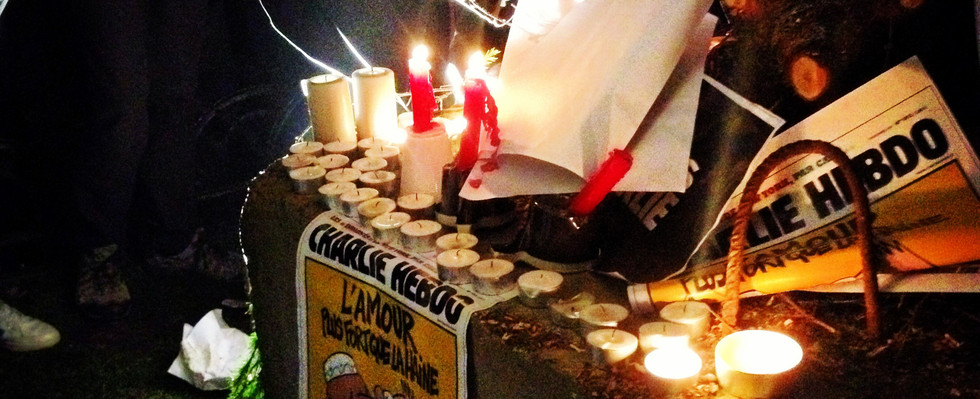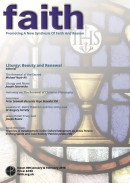A Renewal of the Sacred
Michael Nazir-Ali FAITH MAGAZINE January - February 2016
After the appalling atrocity in Paris, ordinary people, from all walks of life, appeared at impromptu rituals by the wayside. It was very moving to see them light candles and bring flowers to the scenes of the tragedy or to national monuments. At the same time, I could not help but notice the improvisation and the impoverishment of what they were doing. It was very much ‘pick’n’mix and’ make it up as you go along’.
Here were people who had been distanced from a grand narrative of the spiritual and the sacramental and I was reminded of Mother Teresa’s words that she had to come to the West to see ‘spiritual’ poverty’. Promise, judgement and transcendence What we see on such occasions are the results of the progressive disenchantment of European societies. Empirical Science has certainly brought many benefits to communities but a by-product has been an obscuring of questions about social, personal and cosmic meaning. Biblical time which is full of promise, judgement and transcendence has been replaced by the mere succession of chronology. In the Church year the high days and holy days have given way to the mere holidays of the secular year, if only for the privileged. Sacred space, similarly, has been secularised.
This is so not only in the heartbreaking instances of chapels and churches being turned into theatres and restaurants but also in the expectation that active churches are only of social use if they allow themselves to be used for profane purposes. The result of such widespread disenchantment has been that people now simply do not have the vocabulary, verbal or symbolic, to express their spiritual longings or to root their moral convictions in a worldview that sees significance and worth in human beings and human societies but also in the Universe.
They are left either to deny any meaning in life and to see it as absurd or tragic or to make up their own meanings as they go along. One consequence of the decline of traditional Christianity has been the substitution of pastors and confessors with the ‘agony aunts’ of the newspapers and magazines. It seems, however, that they are now telling us that the overriding question which lies behind the problems which their readers bring to them has to do with a cry for fundamental worth, for significance and love in an uncaring and even hostile world.
The disenchantment was brought about by those who, for religious or secular reasons, wanted to banish the Church’s feasts and fasts to the realm of superstition. They have been only too successful in their iconoclastic projects and to such an extent that they have had to allow the return of ritual and the pseudo-sacramental through the back door, even if it is empty and meaningless. Full-scale re-enchantment In such a situation, the Church’s task is not so much to discover the secular meaning of the Gospel or to become the caring and sharing arm of secular society. It is rather to engage in an ambitious project of full scale re-enchantment.
This is one reason why attempts to ‘dumb down’ Christmas, in the name of an alleged multiculturalism, should not be taken lying down. Children are literally taken into an angelic world by the story of the Nativity. Older people connect with carols as with little else: how often I have seen tears running down their faces as they recover precious memories through singing them or just hearing them sung. Even the Christian truth of sacrificial generosity in the story of Santa Claus needs recovering and re telling: a bishop who helped the poorest of the poor. The Church must be ready It is significant that the memorial service for those killed in the Paris massacre had to be held in Notre Dame Cathedral and not in any monument of secular France. The Church has to be ready for every such opportunity, even in tragic circumstances, to bring the assurance and comfort of the Gospel in word and sacrament.
At baptisms, weddings and funerals we need to add Gospel value to rites of passage. The time to strip away and to discard is over. We need now to re-appropriate and to re-clothe our cultures with a sense of the sacred. We should be unapologetic about providing people with both time and space for reflection, meditation and, yes, prayer. Our churches, convents, monasteries and retreat houses can, indeed, becomes centres for the re-enchantment of our culture. This may have implications for the formation of clergy and religious.
Of course, they must be given the means to offer an effective apologetic to a secular world but it must go beyond that to the robust affirmation of a Christian worldview and its spiritual and sacramental consequences in Church and society. The world needs the Christian narrative of creation, redemption and transformation. We should not fail to provide it imaginatively and truthfully.
Dr Michael Nazir-Ali is the former Anglican Bishop of Rochester and now directs the Oxford Centre for Training, Research, Advocay and Dialogue.






